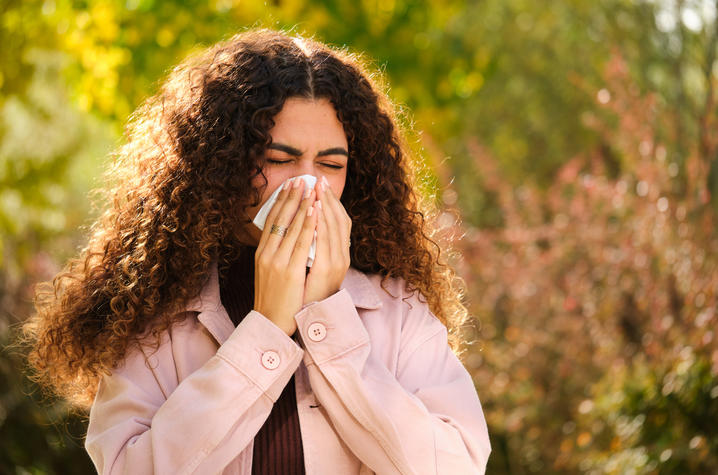Top 5 medications for fall allergies

The University of Kentucky Public Relations and Strategic Communications Office provides a weekly health column available for use and reprint by news media. This week’s column is by Arfa Faiz, M.B.B.S., physician with UK HealthCare Asthma, Allergy and Immunology.
LEXINGTON, Ky. (Oct. 7, 2024) — The early signs of fall are numerous: a slight chill in the air, changing colors of the leaves and — for many Kentuckians — a stuffy nose, itchy eyes and sneezing.
Finding effective relief for seasonal allergies can be crucial for enjoying the season. But if you suffer from seasonal allergies, you know the drugstore can feel overwhelming. From Claritin to Flonase and all the generic options in between, what’s the best solution to your fall allergies?
What causes seasonal allergies?
Pollen is the main culprit year-round for allergies. Trees in the spring, grass in summer and ragweed in the fall are all major producers of pollen locally. This can make seasonal symptoms seem year round.
Allergic rhinitis is the medical term for when we encounter pollen, and it triggers an immune response in people. This includes the release of the chemical histamine in the nose, eyes and throat, along with other chemical helpers. Histamine is often responsible for the itchiness and sneezing, while the other markers cause the stuffy nose or sinuses commonly associated with seasonal allergies.
Antihistamines, some of the most common allergy medications available, counter the effects of histamine. They’re effective in reducing sneezing, runny nose and itchy eyes. The nasal sprays that contain steroids help with the stuffiness.
What antihistamine is right for me?
Many of the well-known antihistamines are nondrowsy and similarly effective, making them ideal for daily use.
There’s only slight differences between them all, and generally people find the antihistamine that works best for them while causing the least side effects.
- Claritin (loratadine): Takes 1-3 hours to kick in.
- Zyrtec (cetirizine): Fast-acting, often less than an hour to take effect, but can cause some drowsiness.
- Allegra (fexofenadine): Causes the least drowsiness. It usually takes less than two hours to kick in and may be slightly better for eye-related symptoms.
- Astepro (azelastine): a safe nasal antihistamine, may taste bad and rarely cause drowsiness.
- Benadryl (diphenhydramine): this is also an antihistamine, but will very likely make you drowsy. So, it’s not best for everyday use, especially if you plan on operating machinery — like driving your car.
While you can take antihistamines when you start to feel symptoms, you can also safely take them daily to keep symptoms at bay. If you have liver or kidney problems, you may want to consider a lower dose. Asking your doctor is also never a bad idea, especially if you have a chronic condition.
What nasal sprays can I use?
Nasal steroid sprays — like Flonase or Nasacort — can be highly effective for long-lasting nasal allergies. They can take close to two weeks to make a difference. They work best if taken every day and sprayed correctly in the nose.
Lastly, keeping your windows closed and air conditioning on can also be helpful in avoiding pollen.
Consider consulting with your doctor if your allergy symptoms are severe or especially persistent. Long-term allergy symptoms can be treated with allergy shots.
UK HealthCare is the hospitals and clinics of the University of Kentucky. But it is so much more. It is more than 10,000 dedicated health care professionals committed to providing advanced subspecialty care for the most critically injured and ill patients from the Commonwealth and beyond. It also is the home of the state’s only National Cancer Institute (NCI)-designated Comprehensive Cancer Center, a Level IV Neonatal Intensive Care Unit that cares for the tiniest and sickest newborns and the region’s only Level 1 trauma center.
As an academic research institution, we are continuously pursuing the next generation of cures, treatments, protocols and policies. Our discoveries have the potential to change what’s medically possible within our lifetimes. Our educators and thought leaders are transforming the health care landscape as our six health professions colleges teach the next generation of doctors, nurses, pharmacists and other health care professionals, spreading the highest standards of care. UK HealthCare is the power of advanced medicine committed to creating a healthier Kentucky, now and for generations to come.




